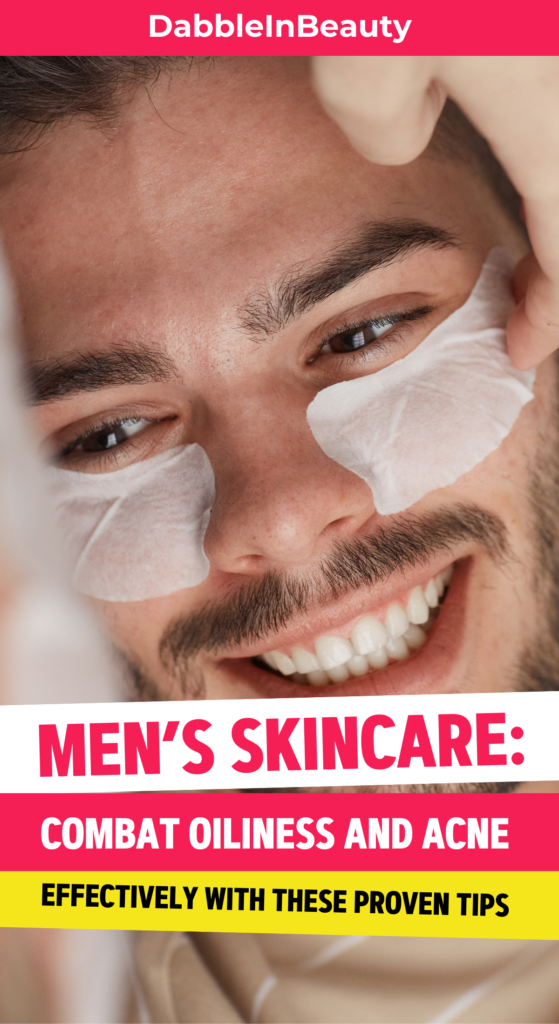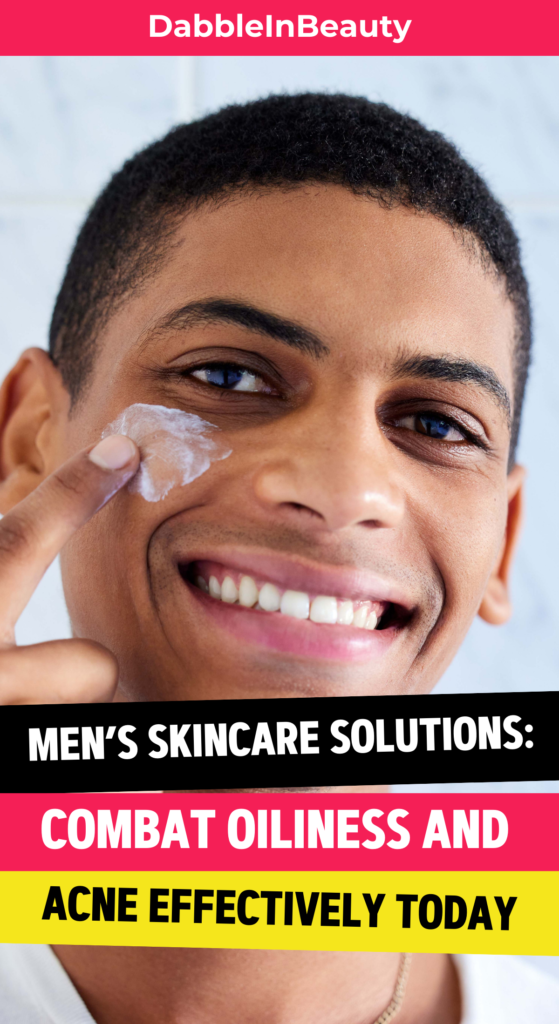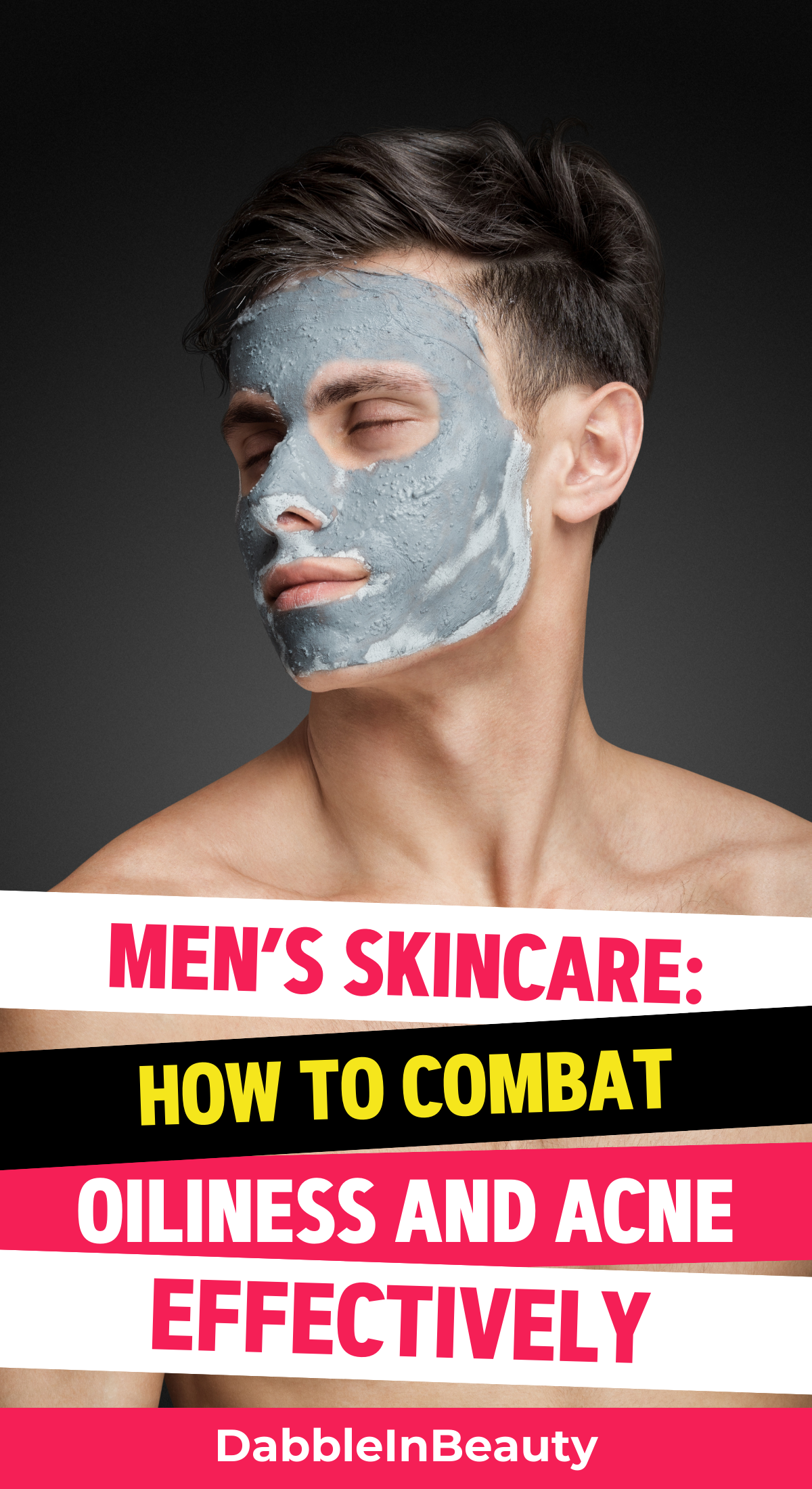As a man, I’ve battled oily skin and acne for years. It’s a fight many of us share, affecting our confidence and making us feel trapped. But, there’s a way out – a path to control our skin and get the clear, healthy look we want.
In this guide, we’ll dive into effective skincare for men to tackle oily skin and acne. You’ll learn about the causes, how to create a skincare routine, and manage shine and breakouts. This will help you achieve a healthier, clearer face.
Key Takeaways
- Understand the underlying causes of oily skin and acne in men
- Develop a consistent, effective skincare routine to combat excess oil and prevent breakouts
- Discover the right cleansers, exfoliants, and moisturizers for your unique skin type
- Explore over-the-counter and natural remedies to treat active acne and minimize the appearance of scars
- Learn when to seek professional help for persistent or severe skin concerns
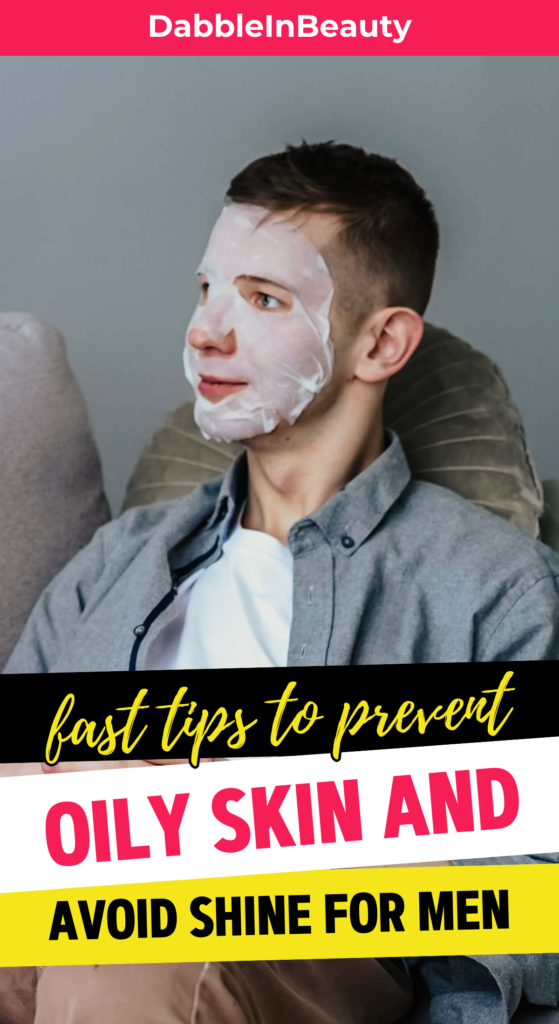
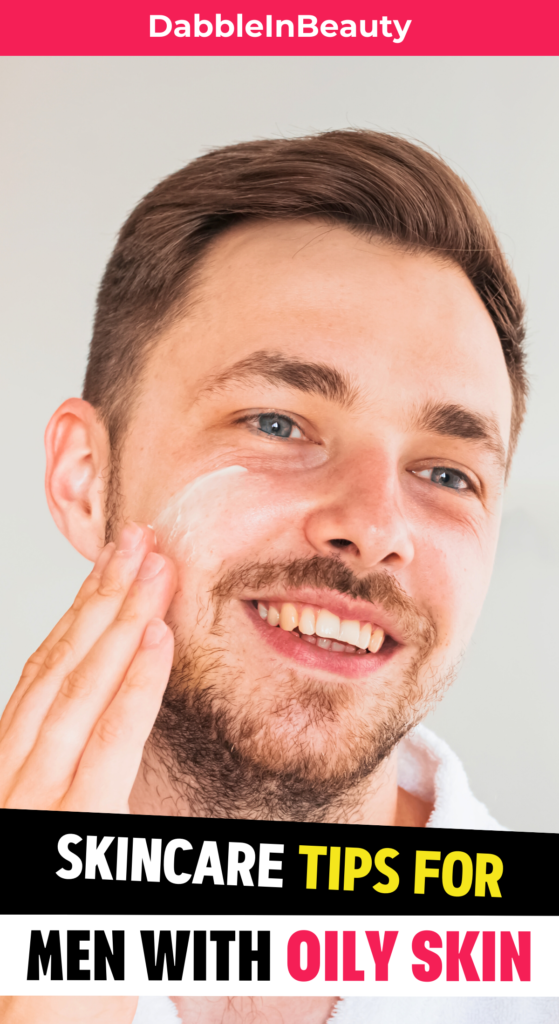
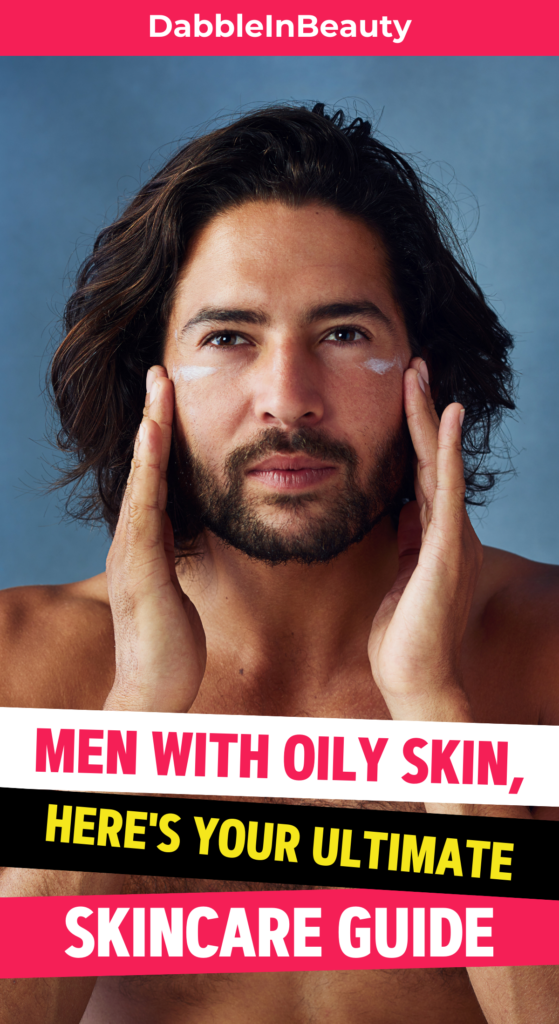
Understanding Oily Skin and Acne in Men
Oily skin and acne often go together, but knowing why is key. Too much sebum, caused by hormones, genetics, and lifestyle, makes skin look greasy. This excess oil clogs pores, causing breakouts.
Causes of Oily Skin and Acne
Hormonal imbalances, especially more androgens, lead to oily skin in men. These hormones make the sebaceous glands produce more oil. Genetics also play a big part, with some men more likely to have oily skin.
What you eat, stress, and some medicines can also affect your skin. They can mess with your skin’s natural oil balance. This leads to too much sebum and more chance of acne.
The Difference Between Oily Skin and Acne
Oily skin and acne are related but different. Oily skin means your skin produces too much oil, making it look greasy. Acne happens when pores get blocked with oil, dead skin, and bacteria, causing blemishes.
Not everyone with oily skin gets acne, and not all with acne have oily skin. But, oily skin can make acne more likely because of the extra oil.
“Understanding the root causes of oily skin and acne is crucial for developing an effective skincare routine to manage these common skin concerns.”
The Importance of a Consistent Skincare Routine
Many men want healthy, clear skin but finding it can be tough. A consistent skincare routine is key to managing oily skin and acne. Using the right products and techniques daily helps fight excess oil and prevents breakouts.
Having a regular skincare routine offers many benefits. It helps control oil, unclog pores, and smooth out your skin. Using targeted treatments can also tackle specific issues like acne or dark spots. Being consistent lets your skin get used to the products and respond well over time.
“A consistent skincare routine is the foundation for healthy, clear skin. Investing just a few minutes each day can make a significant difference in the appearance and overall health of your complexion.”
Creating a skincare routine that fits you is easy. First, figure out your skin type and what you want to fix, like oiliness or breakouts. Choose a gentle cleanser, a good exfoliant, a moisturizer, and any extra treatments or serums you need. Stick to this routine to keep your skin healthy and glowing.
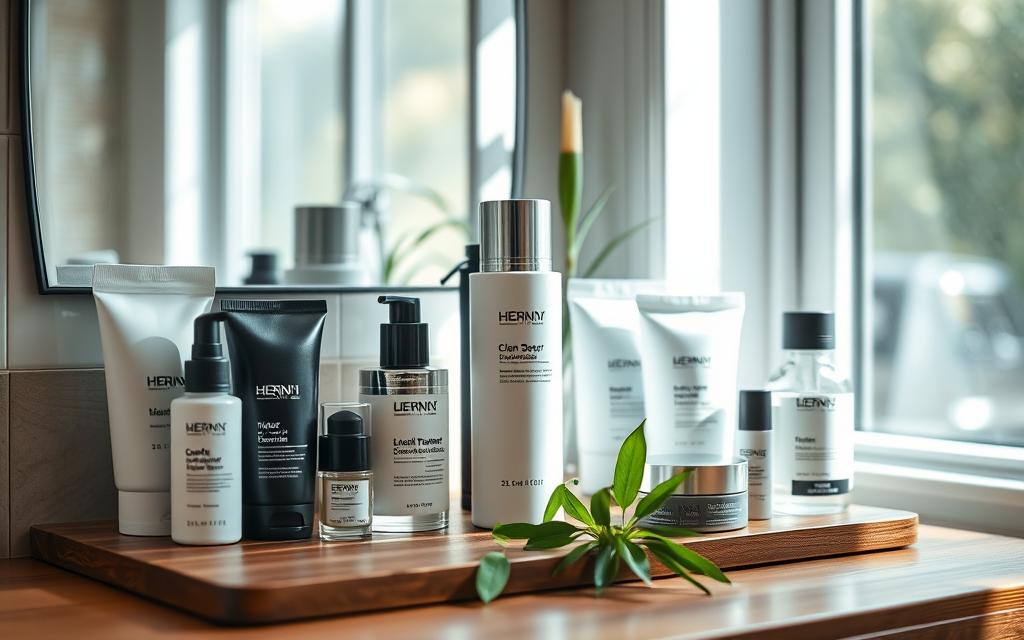
Success comes from being patient and dedicated. It might take time for your skin to adjust to new products. But with regular effort, you’ll see big improvements in your skin’s look and health. Taking care of your skin now will reward you in the long run, keeping you looking young and healthy.
Cleansing for Oily Skin and Acne
Proper cleansing is key for oily skin and acne. You need a cleanser that removes excess oil and dirt without drying your skin. The best ones for oily skin clean well but don’t leave your skin feeling dry.
Choosing the Right Cleanser
For oily skin and acne, look for cleansers with salicylic acid, benzoyl peroxide, or charcoal. These ingredients help clear pores and reduce blemishes. Stay away from harsh cleansers that can make oil production worse and irritate your skin.
Proper Cleansing Techniques
- Wet your face with lukewarm water to open up pores and prepare your skin for cleansing.
- Apply a small amount of your chosen cleanser and gently massage it into your skin using your fingertips, focusing on areas prone to excess oil and breakouts.
- Rinse thoroughly with cool water to close pores and remove any residue.
- Pat your skin dry with a clean, soft towel, being careful not to rub or tug at the skin.
By following these tips, you can keep your skin clear and healthy. Remember, sticking to a good skincare routine is important.
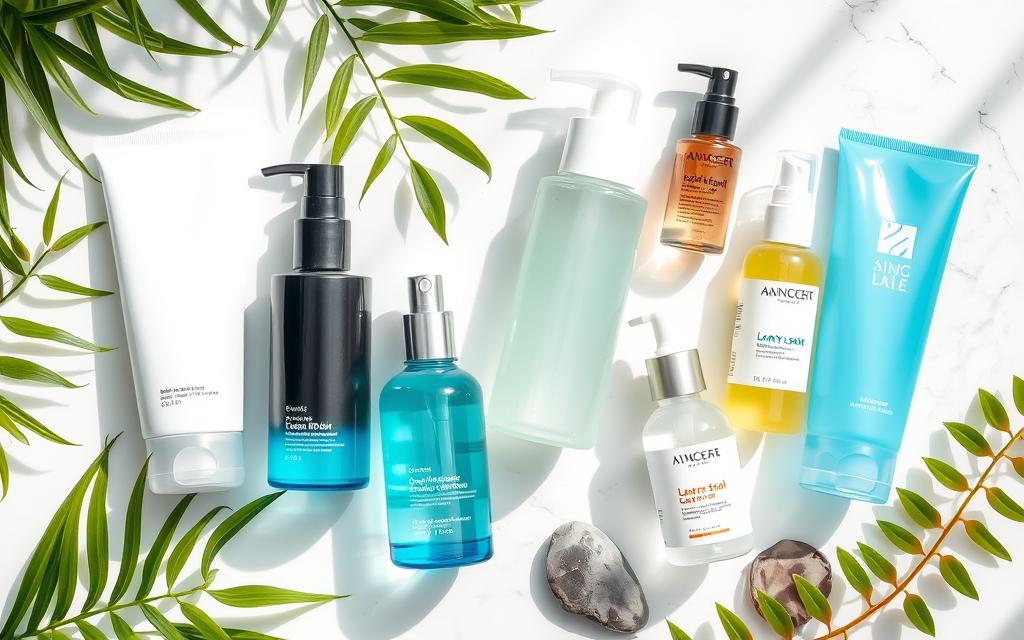
Men’s Skincare for Oily Skin
Managing oily skin and preventing acne starts with the right skincare. A good men’s skincare routine can control shine and keep pores small. It also helps prevent breakouts. Let’s explore the key products and steps for oily skin.
Cleansers for Oily Skin
Begin and end your day with a gentle cleanser. Choose oil-free, non-comedogenic formulas to avoid clogged pores. Avoid harsh cleansers that dry out your skin, as they can make oiliness worse.
Toners and Serums
Add a toner and serum to your routine for shine control and skin texture. Toners with witch hazel or salicylic acid can shrink pores and matte your skin. Serums with niacinamide or vitamin C can tackle oiliness and blemishes.
Moisturizers for Oily Skin
Even oily skin needs moisturizer. Opt for oil-free, gel moisturizers that won’t feel greasy. Hyaluronic acid provides hydration without clogging pores.
Spot Treatments
Have a spot treatment ready for blemishes. Salicylic acid or benzoyl peroxide can dry out and heal breakouts fast.
Creating a consistent skincare routine is crucial for oily skin. Try these men’s skincare products for oily skin and find the essential products for managing oily skin that suit you.
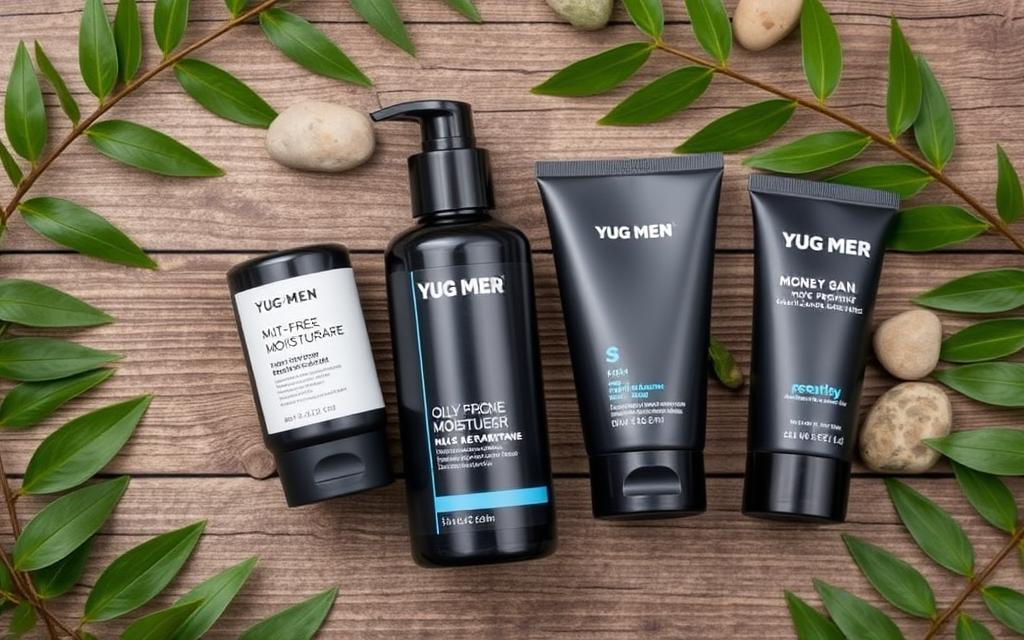
“Caring for oily skin is all about finding the right balance – cleansing thoroughly without stripping the skin, and hydrating without clogging pores. A well-crafted skincare regimen for oily skin can make all the difference.”
Exfoliating for Oily Skin and Acne
Exfoliation is key for men with oily skin and acne. It removes dead skin cells, excess oil, and impurities. This helps unclog pores, improves skin texture, and prevents breakouts.
Types of Exfoliants
Men can choose between chemical and physical exfoliants. Chemical exfoliants like AHAs and BHAs break down dead skin cells. Physical exfoliants use small particles or brushes to remove the top skin layer.
Frequency and Techniques for Exfoliation
How often you exfoliate depends on your skin type. Men with oily skin and acne should exfoliate 2-3 times a week. Be gentle and avoid over-scrubbing to prevent irritation.
Gently massage the exfoliant in circular motions. Focus on problem areas and rinse with lukewarm water.
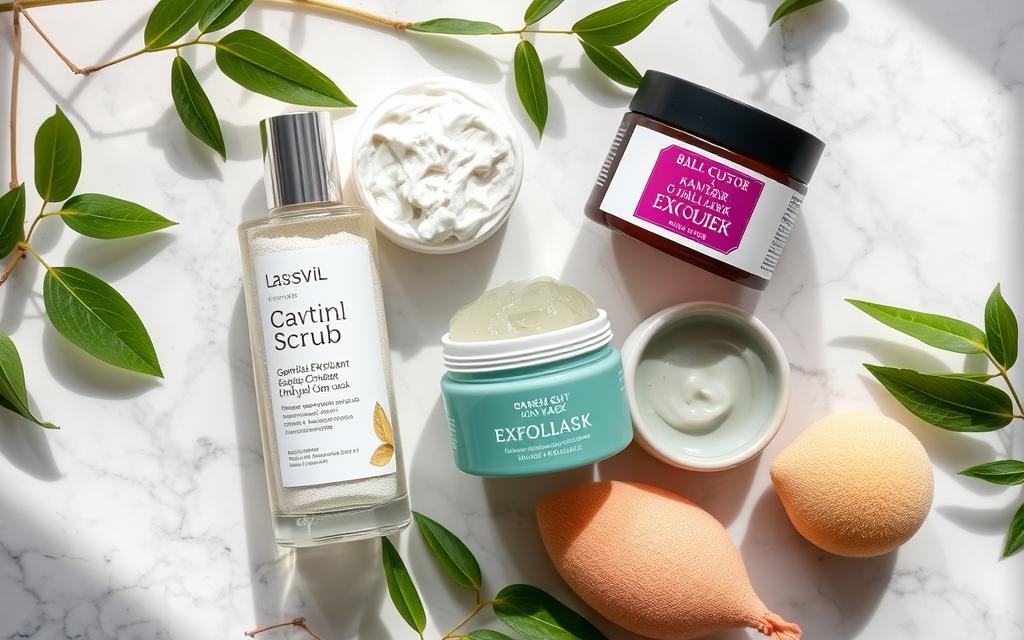
Exfoliation is crucial for managing oily skin and acne. Find the right balance and add it to your skincare routine. Try different exfoliants and techniques to find what works for you.
Toning: The Often-Overlooked Step
Many men skip toning in their skincare routine, missing out on its benefits. Toning can greatly improve your skin’s balance and clarity. The benefits of using a toner are many and can significantly enhance your skin’s health and look.
Toners are key for oily skin, removing leftover dirt, oil, and dead cells after cleansing. They prepare your skin for serums and moisturizers, making them work better.
Choosing the right toner is crucial for men. For oily or acne-prone skin, look for toners with salicylic acid, witch hazel, or glycerin. These ingredients help control oil, unclog pores, and calm irritation.
“Incorporating a toner into your daily skincare routine can make a significant difference in the overall health and appearance of your skin.”
The importance of toning for oily skin and the benefits of using a toner are huge. Adding toning to your routine can help manage oily skin and acne. This leads to a clearer, smoother complexion.
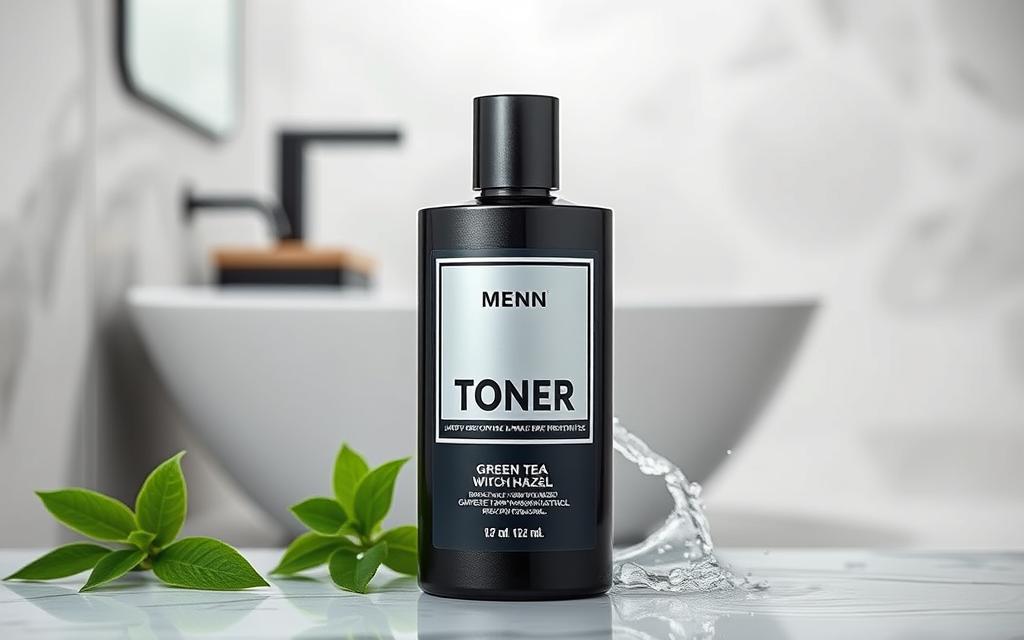
Moisturizing for Oily Skin and Acne
Many think moisturizing is bad for oily, acne-prone skin. But, it’s actually key to keeping the skin balanced. The right moisturizer hydrates without making pores clog or oiliness worse.
Choosing the Right Moisturizer
For oily, acne-prone skin, choose non-comedogenic moisturizers. These won’t block pores. Go for oil-free, water-based ones that are light and absorb quickly. They hydrate without feeling greasy.
Ingredients like hyaluronic acid, glycerin, and niacinamide are good. They keep moisture levels right without extra shine.
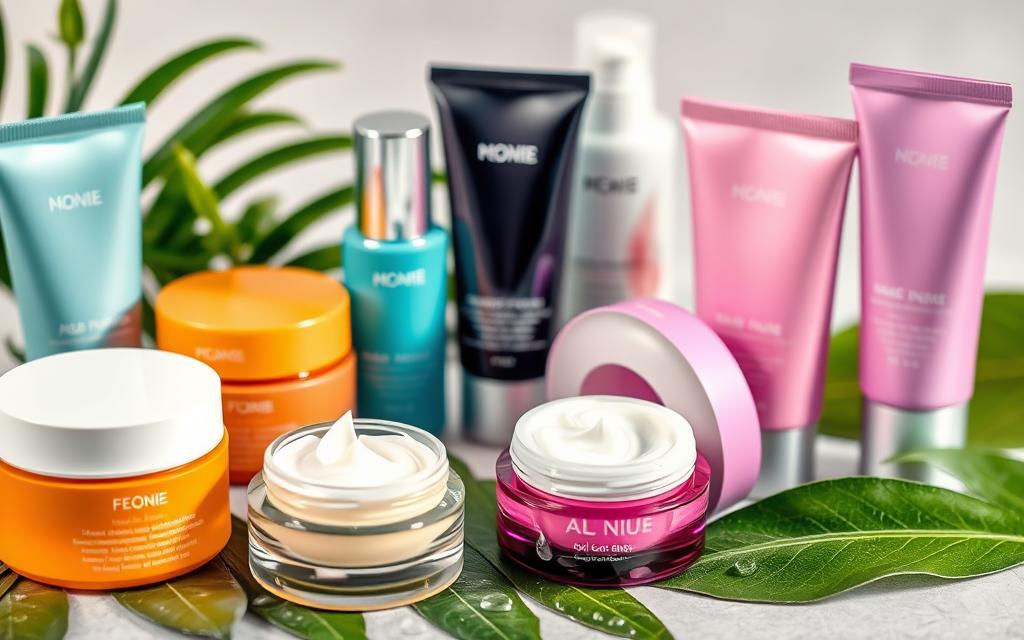
Avoid heavy, oily moisturizers. They can clog pores and make acne worse. Instead, use gel-based or mattifying moisturizers. They hydrate and control shine at the same time.
Using the right moisturizer regularly can make oily, acne-prone skin look and feel better. It keeps the skin healthy and balanced.
Treating Acne with Over-the-Counter Products
For men with stubborn acne, over-the-counter skincare products can be a big help. These products have strong, effective acne-fighting ingredients to fight breakouts and stop them from coming back. Let’s look at the main ingredients in this fight against acne.
Salicylic Acid and Benzoyl Peroxide
Salicylic acid and benzoyl peroxide are top choices for over-the-counter acne treatments for men. Salicylic acid goes deep into pores to clear them and cut down on oil. Benzoyl peroxide kills the acne-causing bacteria. You can find these in cleansers, spot treatments, and more to fight and prevent acne.
Using Retinoids and Alpha Hydroxy Acids for Acne
Retinoids and alpha hydroxy acids (AHAs) are also great for fighting acne. Retinoids clear pores and help skin cells turn over. AHAs like glycolic acid and lactic acid exfoliate and reduce blemishes. Adding these to your routine can attack acne from different sides.
When using over-the-counter acne treatments for men, start slow and add one at a time. Gradually get used to them and follow the directions to avoid irritation. With the right mix of effective acne-fighting ingredients, you can control your skin and get clearer, healthier-looking results.
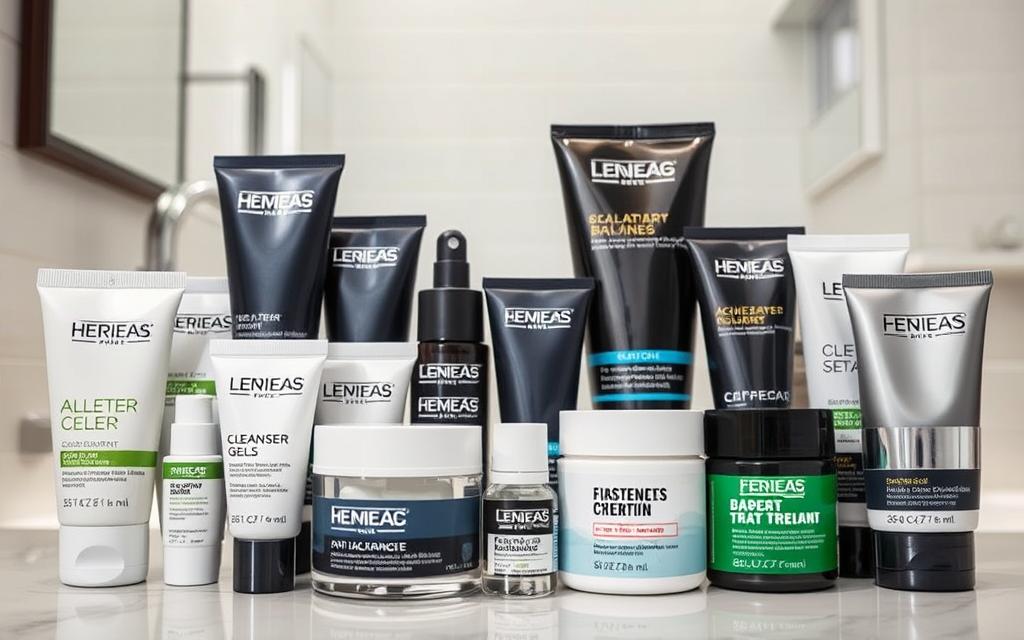
Lifestyle Factors That Affect Oily Skin and Acne
While a good skincare routine is key, it’s also important to think about lifestyle factors. Your diet, exercise, and stress levels all affect your skin. These factors play a big role in how healthy and clear your skin looks.
Diet and Exercise: Keys to Skin Health
What you eat and how much you move can change your skin’s health. Eating too much processed food, sugar, and unhealthy fats can make your skin oilier and lead to breakouts. But, eating more fruits, veggies, and lean proteins can help keep your skin balanced and clear.
Exercise is good for your skin too. Sweating helps get rid of bad stuff and brings nutrients to your skin. Try to exercise for at least 30 minutes, most days, to see the benefits.
Stress: The Skin’s Sworn Enemy
Stress can make your skin produce more oil and cause breakouts. When stressed, your body makes more cortisol, which makes your skin oilier. Finding ways to manage stress, like meditation or yoga, can help keep your skin calm and clear.
Being aware of how your lifestyle affects your skin can help you take better care of it. This way, you can work towards having a clear and vibrant complexion.
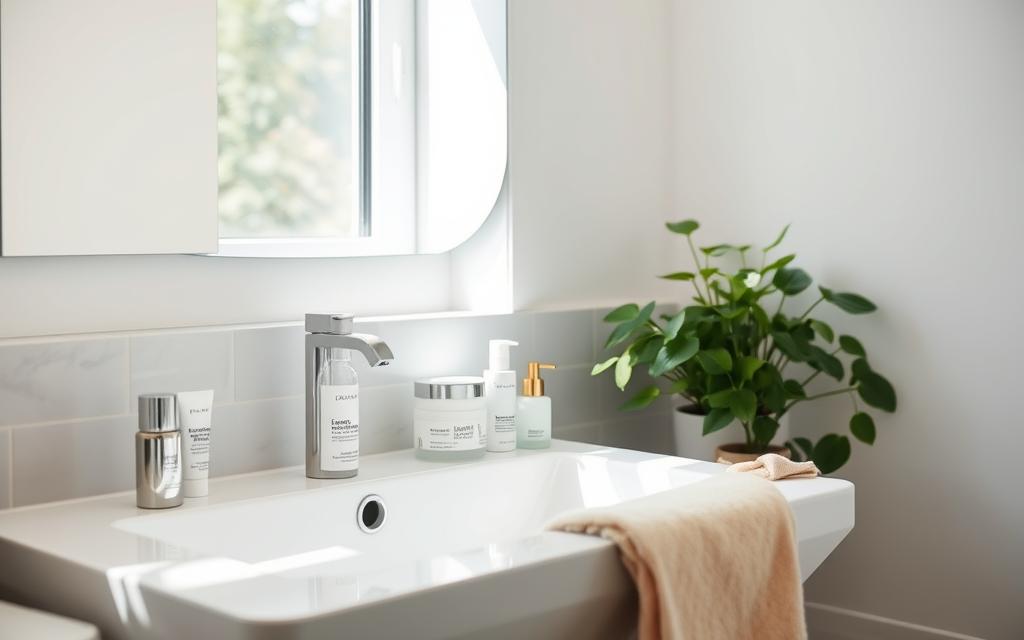
“Taking care of your overall health and well-being is just as important as your skincare routine when it comes to managing oily skin and acne.”
When to Seek Professional Help
Many oily skin and acne issues can be handled at home. But, sometimes, you need a dermatologist’s help. Knowing when to go to a skin specialist can lead to better skin.
Severe acne is a clear sign to see a dermatologist. If you have cystic acne, deep nodules, or lots of blemishes, it’s time to get professional help. A dermatologist can give you the right advice and stronger treatments for severe acne.
Also, if you have persistent redness, inflammation, or scars, it’s a sign to see a dermatologist. These could be signs of deeper skin problems. A dermatologist can create a treatment plan for you and help prevent more damage.
“Professional skin treatments can provide benefits of professional skin treatments, such as improved texture, reduced oil production, and accelerated healing of existing blemishes,” explains Dr. Sarah Hogan, a board-certified dermatologist. “Seeking guidance from a specialist can be a game-changer for those struggling with stubborn oily skin and acne.”
By knowing when to see a dermatologist and trying professional treatments, you can manage oily skin and acne better. This leads to clearer, healthier-looking skin.
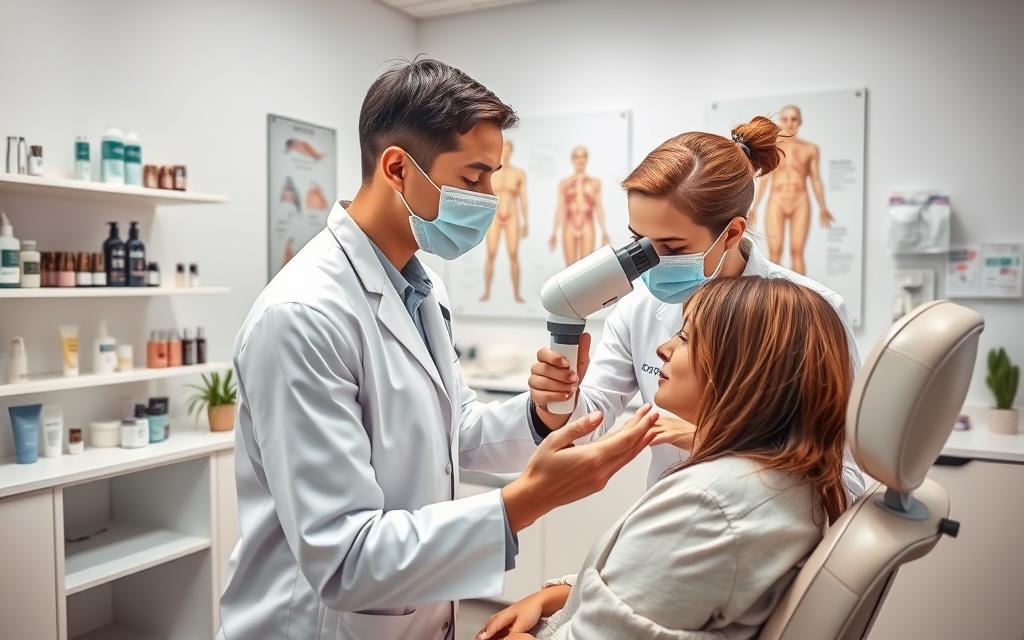
Natural Remedies for Oily Skin and Acne
Conventional skincare products can help with oily skin and acne. But natural remedies are also great. Ingredients like tea tree oil, honey, clay, and green tea offer many benefits. They can enhance your skincare routine.
Tea Tree Oil and Honey
Tea tree oil is known for fighting acne with its antibacterial and anti-inflammatory effects. You can use it directly on blemishes or mix it into a spot treatment. Honey, a natural humectant, hydrates and soothes the skin. It also fights acne-causing bacteria.
Clay Masks and Green Tea
Clay masks are great for deep-cleaning pores and removing excess oil. Look for masks with bentonite or kaolin clay. Green tea, full of antioxidants, reduces redness and swelling from acne.
Adding these natural remedies to your skincare routine can help you achieve a balanced complexion. They can tackle oily skin and acne without just using conventional products. Always test new ingredients and talk to a dermatologist if you have concerns.

“Natural remedies can be a powerful complement to your skincare routine, offering a gentle yet effective way to address oily skin and acne concerns.”
Makeup for Men with Oily Skin and Acne
Managing oily, acne-prone skin starts with a good skincare routine. But, some men might also use makeup to control shine and hide blemishes. We’ll look at the best primers, foundations, and makeup techniques for a smooth, matte finish.
Primer: The Key to a Long-Lasting, Shine-Free Look
The right primer is key for men with oily, acne-prone skin. Look for oil-free, mattifying primers with silica or dimethicone. These ingredients absorb excess oil and create a smooth base for your foundation. Apply it to clean, moisturized skin, especially in the T-zone where shine is most common.
Foundation: Achieving a Natural, Shine-Controlled Finish
Choosing the right foundation is crucial for oily, acne-prone skin. Opt for oil-free, non-comedogenic formulas that give a matte or semi-matte finish. Water-based or powder foundations are good choices as they are less likely to clog pores. Use a damp beauty sponge or a kabuki brush for even, natural coverage.
Blotting Papers: Your Ally in Shine Control
- Keep a pack of oil-blotting papers handy to quickly absorb excess shine throughout the day.
- Gently press the papers onto the oily areas of your face, such as the forehead, nose, and chin, to soak up excess oil without disturbing your makeup.
- Avoid rubbing the papers, as this can disrupt your makeup and spread the oil around.
By following these tips and techniques, you can get a fresh, shine-free look. Even with men’s makeup, your acne-prone skin can look its best.
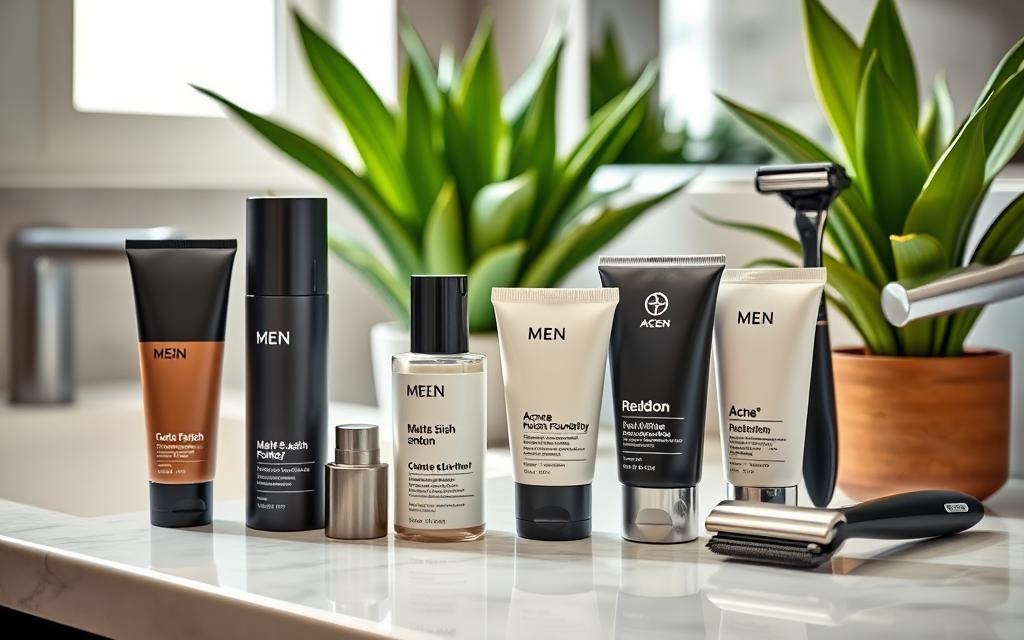
Dealing with Acne Scars and Hyperpigmentation
Dealing with acne can be tough and never-ending. The scars and dark spots left behind can be just as hard to handle. Many men struggle with these issues after their acne clears up.
Understanding how to reduce scars and dark spots is crucial. There are many treatments and techniques out there. We’ll look at both over-the-counter options and professional procedures.
Targeting Acne Scars
Acne scars come in different types, like depressed or raised marks, and discoloration. To treat these scars, look for products with certain ingredients:
- Retinoids: They help make collagen and get rid of old skin cells, making scars less noticeable.
- Vitamin C: It’s an antioxidant that can lighten dark spots and even out your skin tone.
- Alpha Hydroxy Acids (AHAs): They exfoliate your skin, making it smoother and improving its texture.
Using these ingredients regularly, along with sun protection, can help reduce the look of scars over time.
Preventing Post-Inflammatory Hyperpigmentation
It’s also key to prevent post-inflammatory hyperpigmentation (PIH), a common acne side effect. PIH shows up as dark spots or discoloration after a breakout heals.
To prevent PIH, add these steps to your skincare routine:
- Use a gentle, non-irritating cleanser to avoid more inflammation.
- Apply a broad-spectrum sunscreen every day to protect your skin from UV rays, which can make discoloration worse.
- Try adding brightening ingredients like niacinamide and licorice root extract to fade dark spots.
By tackling both acne scars and PIH, you can work towards a clearer, more even-toned skin.
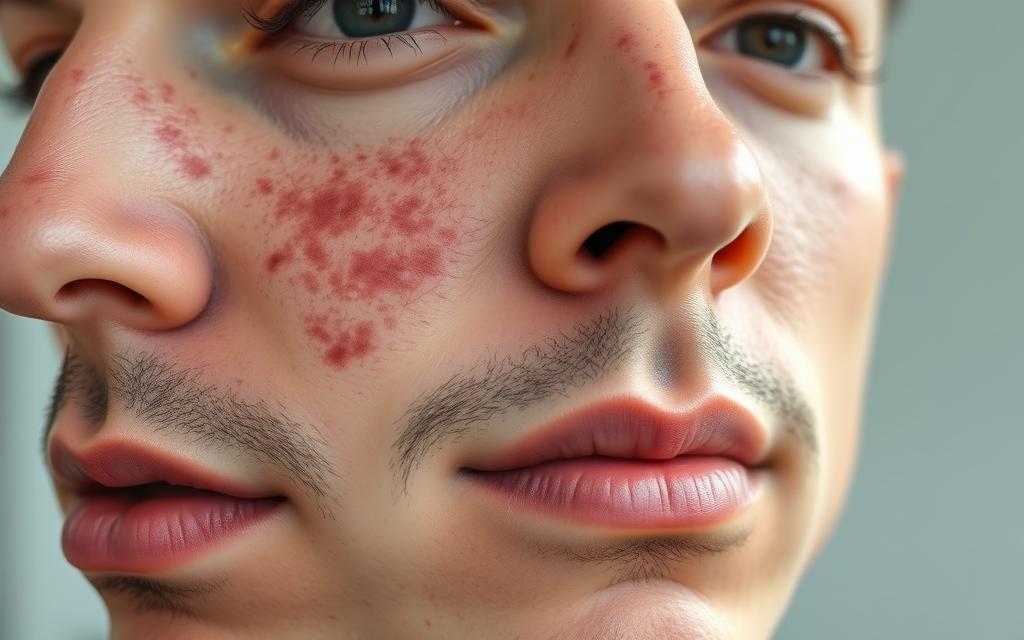
“Consistent and targeted treatment is key to improving the appearance of acne scars and discoloration.”
Conclusion
Managing oily skin and acne in men needs a detailed plan. Understanding the causes, sticking to a skincare routine, and making lifestyle changes help. This way, you can get a clear, healthy face that makes you feel good about yourself.
This guide shows how important it is to clean, exfoliate, and moisturize your skin. It also talks about using acne treatments and natural remedies wisely. Living a balanced life, managing stress, staying hydrated, and eating well are also key.
Getting and keeping clear skin is a long-term effort. But, if you stick to your skincare plan and make smart choices, you can beat oily skin and acne. With the right steps, you’ll have a glowing face you can be proud of. Start your journey and see how easy it is to have healthy-looking skin.
